As a part of our Holoflow interviews, we had the honor to interview a wonderful writer, Susanne Wittpennig. She is the author of the “Time Travel Girl” series, which she wrote with inspiration from the “Back to the Future” movies. Not only has she created one-of-a-kind yet familiar characters with depth and an engaging plot, but she has also demonstrated a great understanding and enthusiasm for the evolution of technology.
Susanne Wittpennig was born in 1972 in Basel, Switzerland. A writing prodigy, she wrote her first booklet at the age of five. When she was ten, she suffered the tragedy of losing her younger brother in a car accident. She turned to her world of writing for rescue and comfort. At the age of eleven, she wrote the first draft of what would later be her bestselling series “Maya and Domenico” (370,000 copies sold in German-speaking countries).
Susanne Wittpennig has worked as a web and graphic designer for several years. Her experience there helped her learn how to illustrate her books professionally. She did such an amazing job that now even the book covers have a cult following. Susanne earned her bachelor’s degree at a Norwegian film academy. There she even gained more inspiration for “Time Travel Girl” and the necessary knowledge to one day make her dream come true and turn the book series into a movie.
If you work in tech or are enthusiastic about futuristic technology, the “Time Travel Girl” series is an excellent choice of reading for you. I know you wouldn’t want to miss out on a novel dedicated to your passion, with such a superb storyline, heartfelt dramas, and breathtaking plot twists. I now welcome you to read Susanne Wittpennig’s beautiful words and enjoy her thoughts and comments.
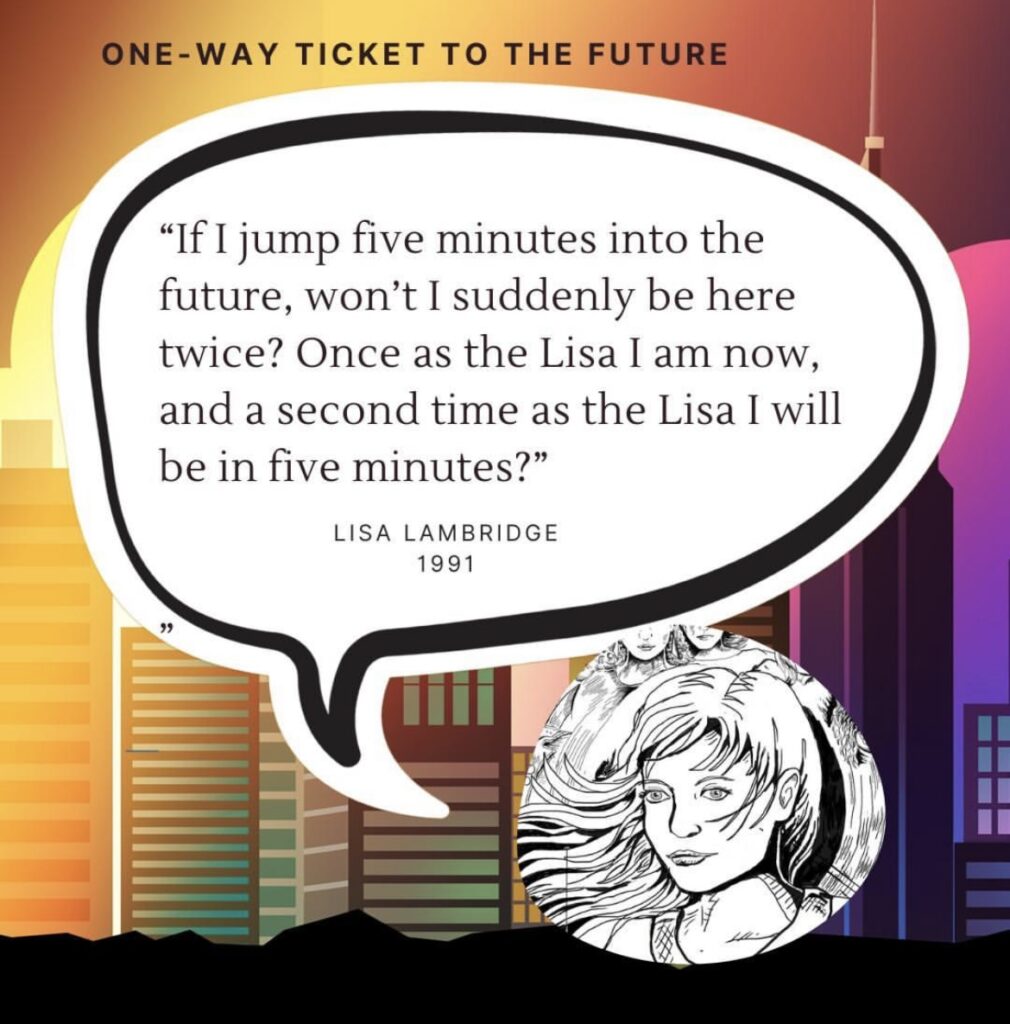
1. I know you’ve been writing since your childhood. It’s very impressive. Would you mind sharing some of your earliest writing experiences?
One of my earliest experiences with writing was when I was five years old. As a pre-school child, I could already read some letters and form them into simple words. So I wrote my first little story using the letters I knew, and the ones I didn’t, I just made up. I didn’t want anyone to read the story, so I hid the little book, but the better I hid it, the easier my father could find it. He was so interested in the fact that I could write at such an early age that he never gave up trying to find the booklet. Unfortunately, it disappeared over time.
2. How did your early experiences help you write your books as an adult later in life?
The fact that my father was so interested in what I was writing and that he was touched by the feelings I was already describing in my first stories, encouraged me in a way to continue. I wrote my first short novel at the age of nine. It was a fantasy story I had made up with my brother, and it was my greatest wish that this story would be read by many people and sold in a bookstore. So I made several copies from my hand notes (note that this was the early eighties and computers were only a distant dream) and crafted them into books with glue and cardboard. After my father read it, he told me that he had tears in his eyes at the end of the story. This made me very proud because I thought that only a good writer could make people cry with her story.
3. Please tell us about your “Time Travel Girl” series.
You know, I’ve always been interested in technological advances. In the beginning, I wrote my stories by hand, and I always dreamed of an advanced technology that would allow me to design my own books, including drawing the book cover. That was out of reach for a little girl like me. As I grew up, technology advanced, and eventually I had the chance to write my stories with a computer. That was in the early nineties. My dreams went even further than just a simple computer: what if I had a computer so small that it could fit in my pocket, and I could write my stories anywhere? With the invention of the iPad, that dream also came true. Technology has always fascinated me, so I love time travel stories, especially when people from the past end up in the future and have to cope with the new inventions there. It’s no coincidence that „Back to the Future“ is my favorite movie. I’ve been writing diaries since 1985 (the year „Back to the Future“ came out), and I named my diary „Lisa“. Reading my diary is like going back in time. So the idea for a time travel story grew. I wanted it to be realistic, the way the future might look like. Some time travel stories are exaggerated, with aliens visiting Earth, and so on. I didn’t want that. Because if there are aliens out there (which I personally don’t believe), why would they come sometime in the future? They could just as easily have visited us in the past. That doesn’t make any sense to me. I wrote the Time Travel Girl story as a trilogy: 1991, 2021, 2049 (the last volume is still in the works and I’m not sure yet if I should set it in 2049 or 2051). The first volume, 1991, had to be set in a time before the Internet became public and before the first short text message was written. The Internet opened its doors in August 1991, so this was the last possible year. Volume 2 has to be as close to the present as possible. The present is a brief moment, in the blink of an eye, it becomes the past. I wrote 2021 before COVID-19 hit the world, so I had to incorporate this history-changing event into the story. The original series was written in German, that’s why the years don’t match with the English version: 1989, 2018, 2047). I did the English translation with an American friend, and it is an expanded version of the German books with some adjustments for current times. I can’t say for sure when the third book will be published, I hope it will be in 2025 at the latest.
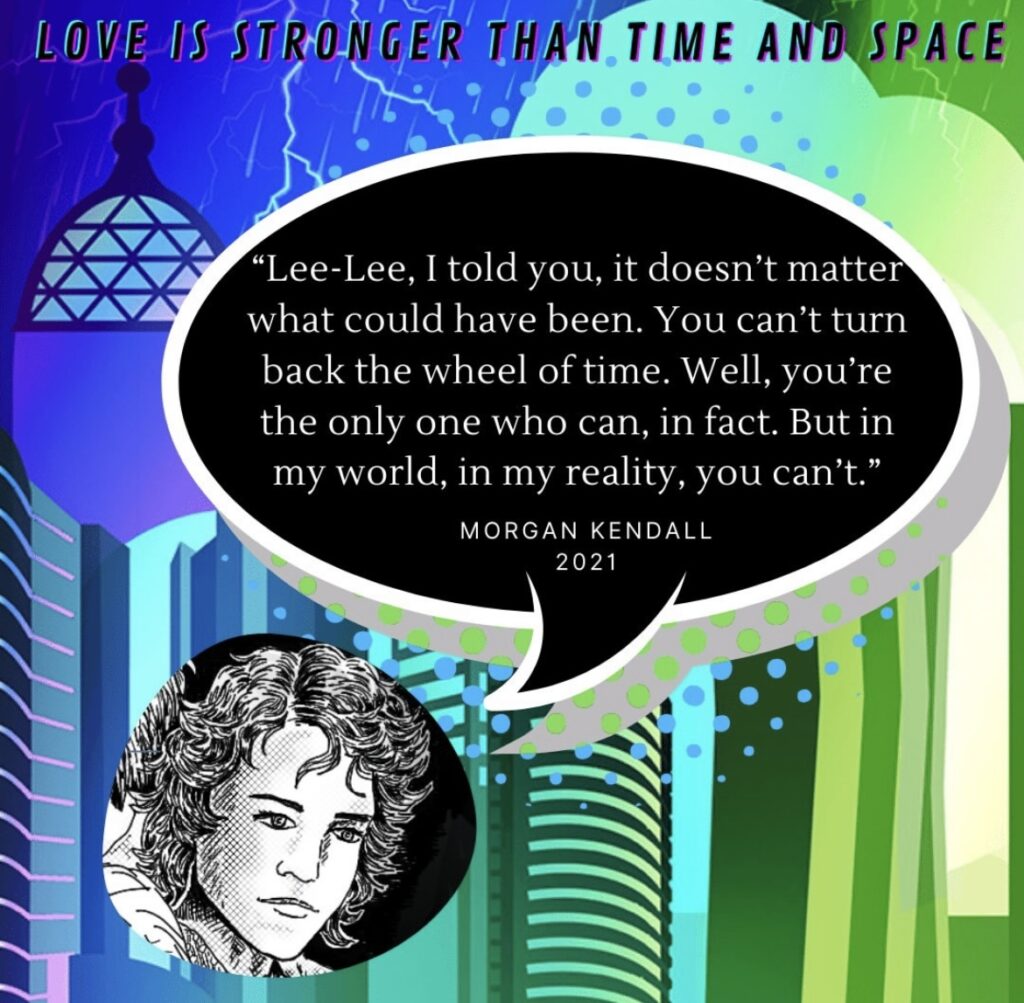
4. Are the “Time Travel Girl” series characters based on people you know?
In a way, I would say yes. The main character Lisa has something of me, for example, her interest in technology and also her appearance. She looked like me when I was a teenager. Also, her passion for the music of the eighties is similar to mine. Like her, I was an outsider and was friends with other outsiders. Her best friend, Britt, is very much like my best friend in my teenage years. Unlike Lisa, she hates technology, just like my former best friend. The two boys Lisa falls in love with, Morgan and Kyle (one in the past, one in the present), have a lot in common with someone I once had a crush on, too. So, yes, I can definitely say that some of the characters correspond to people I once knew or still know.
5. How is developing purely imaginary characters different from writing about characters who are inspired by individuals you know?
I think there’s almost no character that I invented from scratch. They all have at least a small part of someone I knew. Unconsciously, we’ve created our stereotypes, sort of pigeonholes that we put people in. We immediately characterize people based on what we see, like how they act and speak. Oh, she’s a typical Barbie girl, we say, or, he’s a typical bachelor. A typical mad scientist or a typical mentor. Stories often have their prototypes, so I never felt like I was inventing an entirely new character. It is said in Proverbs in the Bible that there is nothing new under the sun, and in my opinion, this has proven true in my life and writing. In addition, my characters are usually based, at least in part, on people I know.
6. One of the things that fascinates me about the “Time Travel Girl” series is that you describe technology’s remarkable impact on our lives in exquisite detail, unlike anyone else. You demonstrate a deep understanding of how astonishing it is to live in the times of modern technology or not. The majority of us simply take it for granted and are unaware that there was a time not long ago before we even had smartphones. Can you please elaborate on this subject?
As I mentioned earlier, I’ve always been fascinated by technology. I remember dreaming of something like an iPad when I was a young girl. In the eighties, that was unthinkable. One night I had a dream that I was holding a small computer in my hands that resembled an iPad. A computer that you could do anything with and it worked in different colors and shapes. When I woke up, my first thought was, “Oh my God, I wish I had one of those things.” When smartphones and the iPad were finally invented, I remembered that dream and realized that reality was much more than I could have imagined in the eighties. When I was a kid, my dad predicted that in the future we would have flat-screen TVs with built-in video players. And guess what? We have flat screens, but we don’t need video players anymore. The technology is even more advanced. It still fascinates me to imagine what technology will look like in ten, twenty, or thirty years and how it will affect our daily lives.
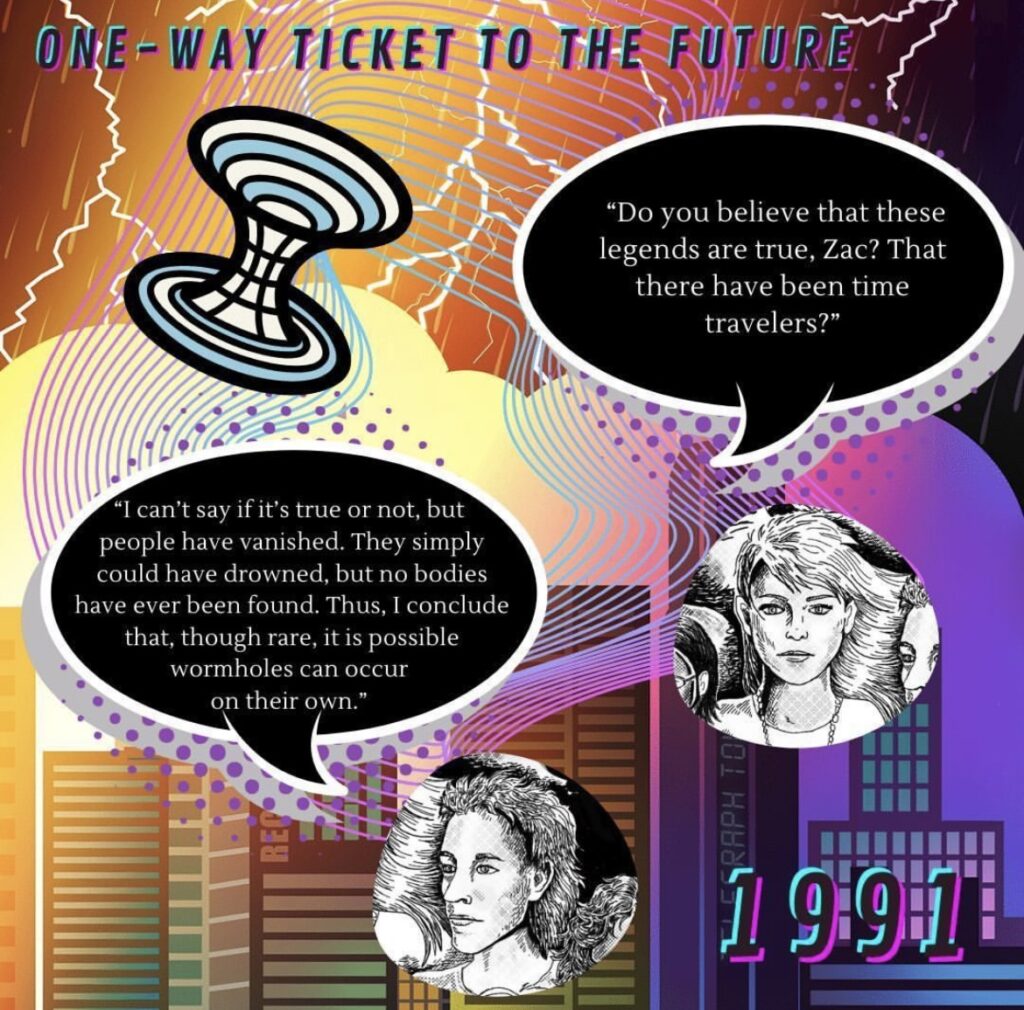
7. I understand that in book three, your main character, Lisa, travels 28 years in the future from where we are now. To what extent will Lisa in the “Time Travel Girl” series explore the wonders of future technology?
That will definitely be one of the main themes. This time she has her friend from 2021 with her, who will have the same experience as she did when she traveled thirty years into the future from 1991. This will have a double effect: First, there’s this girl from the twentieth century discovering technology in the future nearly 60 years ahead of her time. And there’s her boyfriend from 2021, our present day, who also experiences some wonders of a technology he’s unfamiliar with, although as a digital native, his amazement is limited, unlike Lisa’s
Both go to school in 2049 and learn how technology will affect their old high school, and they visit their old home. Technology is pretty much everywhere.
8. I’m quite interested in hearing what you think about the “metaverse,” a popular term these days. Can we anticipate it showing up in the series?
Absolutely. I’ve already invented a name for it in the future. It’s in fact in the Metaverse, where the teenagers and other people of the future will meet. I imagine that the metaverse will be even more developed than what I describe in 2049. When I wrote the source text in 2020, AI wasn’t as much of a conversation as it is in 2023, but now it’s starting to affect more and more of our working lives, and even our daily lives.
Now, as I translate the third book into English, I realize that I need to make some adjustments as technology is advancing faster than expected. Thus, the metaverse will also be more advanced than I now imagine. I’m trying to calculate the progress of the metaverse based on the progress we’ve seen in other technologies in the past, but I’m beginning to suspect that it will be much faster.
9. If you were to write a spin-off about a side character in the “Time Travel Girl” series, which would you pick and why?
It will be for sure Morgan, Lisa’s secret love, whom she calls Momo. We meet him at different ages in all three books. His journey has not been easy, and there is much to tell about him and his struggles, but also about his process of finding answers about his past and his future. His example represents how much the past can affect the future if one is not careful. The future is not just about technology, but also about your personal life and the choices you make. This is the second major theme in my books. What is your personal future? Who will you be in thirty, or sixty years? Thanks to her time travel, Lisa can save Momo’s life. But in reality, there is no one traveling through time to save you. It’s your choices that determine your future. This is best demonstrated by Morgan’s life, and that’s why he’s one of my favorite characters.
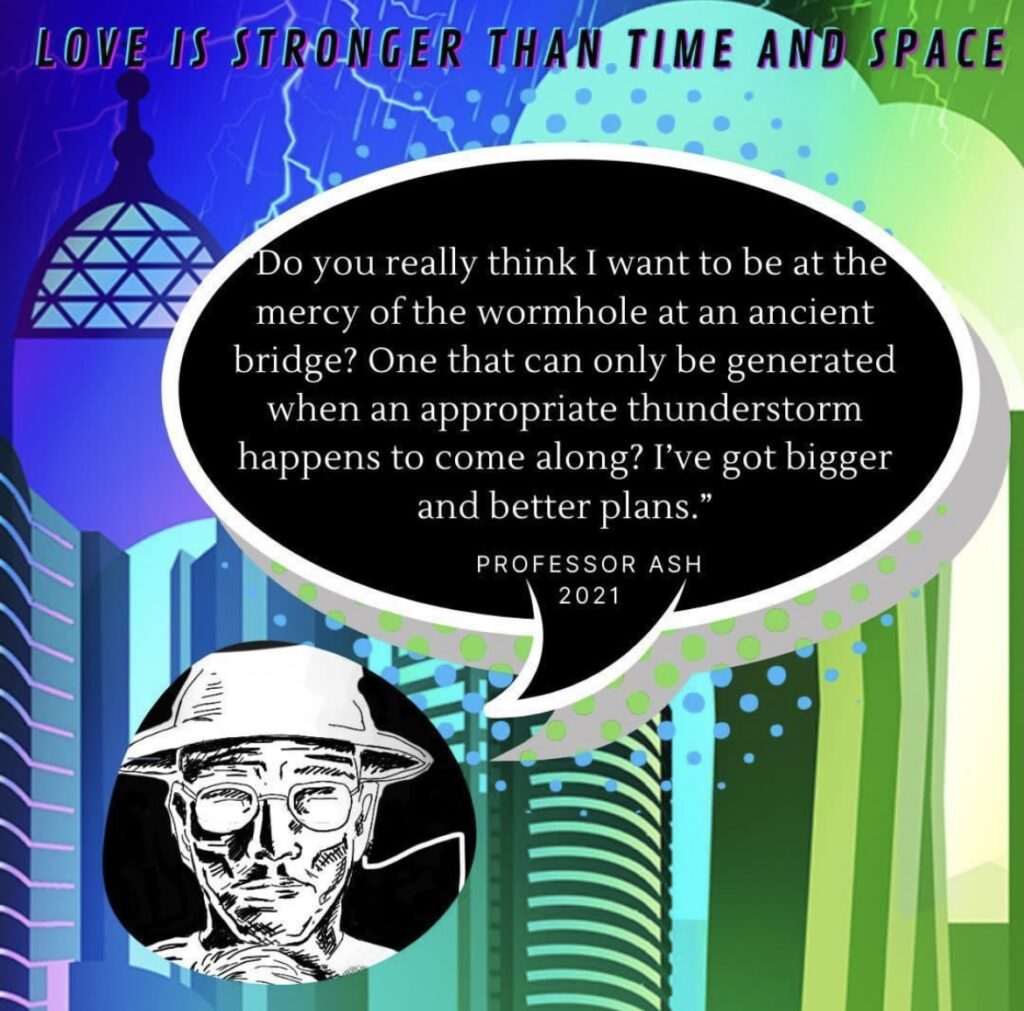
10. How much research did you need to do for your book? And how long did it take you to write the series?
I wrote the series in German from 2016 to 2020, with a creative break in between. When describing the past, 1989 (in German) and 1991 (in English), I had to do some research. Sure, I had all my memories, but which song came out in which year, for example? Was a certain song that I wanted to mention in my book already on the charts in 1991? These were details that I couldn’t remember. When was the Internet invented? What kind of computers were there in 1991? When did people start buying CDs? However, I had to do a lot more research for the future to write Volume 3 as realistically as possible. What technologies can we expect? What do futurologists say? What will be realistic, what not? What measures will be taken to protect the environment? What will people eat in the future? How will they dress? What trends might emerge in society? It’s not just about how technology will develop, but also about what will really affect people’s lives. Not everything that is invented is practical. Either it’s too expensive to produce or you need a bunch of devices in the house to enable a certain technology. I would say that the metaverse and the associated headsets haven’t really affected people’s everyday lives yet. Who wants to have these huge headsets on their head in everyday life? Only computer freaks and gamers. So in my opinion, it’s not yet fully developed, and I think there will be a huge progress taking place within the next years.
11. What is one scene in the “Time Travel Girl” series that was most challenging for you to write?
The explanation of how time travel works. You see, time travel has not yet become possible. There are rules in the timeline that cannot be circumvented. Every time travel story is in a way incoherent. There is always a flaw, something that doesn’t fit together. I have tried to find an explanation for the incoherence in time travel. However, I am not a scientist. I was just trying to understand it with my logical mind. My conclusion was that it is not possible to write a time travel story without incoherence because the math just doesn’t add up. You could argue with that, but that’s my conclusion. That’s the grandfather example: If you travel back in time and kill your grandfather, you cause a time paradox, because then how can you travel back in time if you don’t exist because you killed your grandfather before you were even born? And what happens if you suddenly exist twice in the timeline, an older and a younger you?
It was a challenge to make this plausible. When I finally found an explanation, another what-if question would pop up. And so on. Eliminating all possible inconsistencies was almost a brain killer.
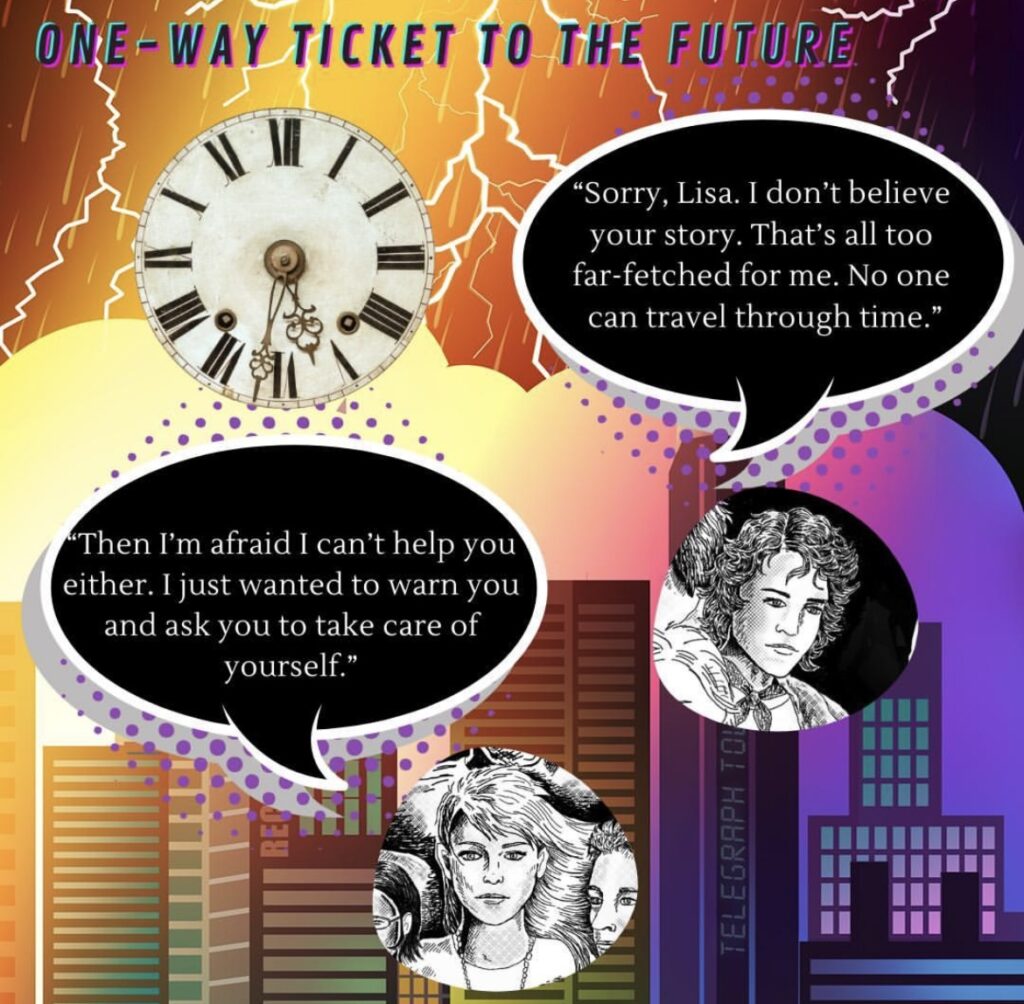
12. Do you work in any other fields besides writing professionally? Could you describe how you maintain the balance between the two?
Besides writing, I’ve been doing various things. In between I work as a web designer and graphic designer, but just sitting at the computer has become a bit unbalancing. As a writer, I have to write about people, so contact with other people has become more important in my more mature age. Now I work as a tour guide with guests from all over the world. So I am constantly developing my public speaking and people skills, which is very important for a writer. This creates a healthy balance in my life.
13. What is your writing process like?
Most of the time, my writing process increases as the deadline approaches until it becomes a painful process. I end up having to push life out of my head to finish, sitting at my desk around the clock until my neck hurts. I’m still learning to avoid such time pressures and to improve my technique and approach to things. I always enjoy getting started on a new book, and I hate having to weed out the little mistakes at the end. It helps if I leave my apartment and sit in a café for two or three hours. I’m more productive then because I know: I’m there now and I want to concentrate for the next two hours. Because at home you see too many things that you should be doing. And yes, writing also means ignoring your to-do list from time to time. To-do lists never end, so you have no choice but to skip things sometimes or simply put them off. Otherwise, you’ll never finish your book. And music definitely helps. Especially for a time travel story, it has to have something mystical, and futuristic about it.
14. What risks have you taken with your writing that has paid off?
I reduced my workload to 50%. This meant that I had to make do with less money in order to have more time to write. I can’t say that it has paid off financially, but some things are worth more than money. Yes, it sounds a bit trite, but when I look at my friends of the same age, I hear them say that they wish they had more time and that they have many dreams that they can never fulfill because they simply don’t have the time. I have made the time to fulfill my dreams, but of course at the expense of other things, e.g. I can’t afford the apartment I envisioned and have to make do with less, but I enjoy the freedom that others want. So which is the better choice? Everyone has to decide that for themselves. Of course, there is still a chance that it will pay off financially one day, but if it didn’t, would I have chosen a different path? I don’t think so. The grass isn’t greener on the other side, even if we might think it is.
15. You illustrate your own books. Can you tell us about the process?
For me, the book cover needed to look like the story was told. I’ve always hated it when the characters on the covers don’t look like the author describes them in the book. And that happens very often because usually a graphic designer who hasn’t read the book designs the cover. I didn’t want that to happen. So I decided to do it myself. That meant I had to teach myself graphic design and Photoshop. Fortunately, I was a career changer in web design, so I had time to acquire the necessary knowledge. I have no training in graphic design, I have to admit, so the feedback on my designs was critical at first. But I have learned! In the end, the readers of my books responded positively to my efforts to design the characters as I described them in the books, and now the covers even have a cult following.
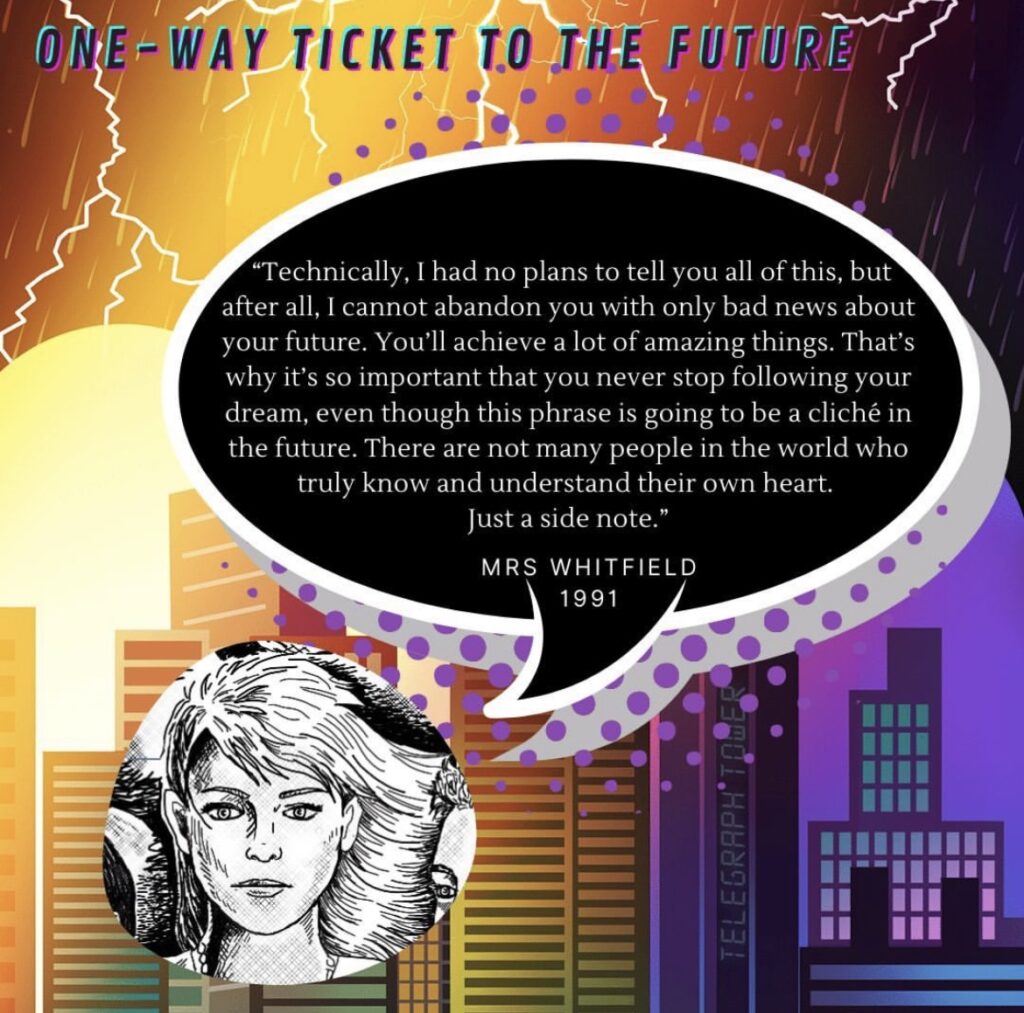
16. You have a background in film studies. Do you ever consider making a movie about the “Time Travel Girl”?
Sure, that’s why I visited a film school. What sounds a bit trivial is actually true: it has always been my dream that my books would become movies. As a writer, you always have a movie in your head when you write. You „see and hear“ the characters. They are not appearing between the lines, they are alive in your mind. Writing is simply the easiest way to express the stories you have in your head. It costs nothing but time. A movie, on the other hand, is an expensive project. Not only do you need money (and time), but you also need people. Talented people who are willing to commit to a particular project. So, yes, I would love to make a movie about Time Travel Girl. Absolutely. And no, I don’t have the money or the people to do it. Maybe I’ll have to wait until artificial intelligence gets to the point where all I have to do is enter my prompts and the AI creates the movie. I’m sure that will be possible one day (something I also dreamed of as a child, by the way). In any case, my film training helps me to shape my texts so that they can be turned into a screenplay without having to change the book too much.
We all know the problem when a movie comes out that is based on a certain book and then disappoints the audience because it just doesn’t match the book. Avoiding that was one of the main reasons I went to film school. You see, somehow I still believe in my dream. What isn’t can still be. And what did a friend tell me? “Your books read like a script for a movie.”
17. What do the words “literary success” mean to you? How do you picture it?
Over the years, I have had to redefine the term “success”. For most people, success means that many people read your books and that you earn a lot of money. Because it means that you’ve written a good book. But that’s not always the case. Many famous books are badly written and they still sell in large numbers. Just because the marketing is excellent. In contrast, many unknown authors with great talent simply didn’t have the chance to make it to the top because they weren’t in the right place at the right time. Nevertheless, their works touch people more than a number one success. Let’s be honest: when was the last time you bought a book just because it was announced as number one and because everyone seemed to have read it, only to be disappointed after reading it and think: was that it? What was all the fuss about this book? The author may make a lot of money, but is it really a success? I would say no. To me, success means that you touch people’s hearts with your work and that you positively influence or even change their lives. That’s what I call success. Yes, that sounds banal, but that’s the conclusion I’ve come to over the years of my writing career. Not all my books have sold well. But some of my books have inspired people to live better lives. One of my books even became a number-one hit simply because people were touched by it. Then I call it a double success.
18. Where can people go to learn more about you?
You can find out more about me and my work on my websites: English website, German website, or my Instagram accounts @thetimetravelgirl and @susannewittpennig_autorin, and my Facebook accounts Time Travel Girl and Susanne Wittpennig Autorin.

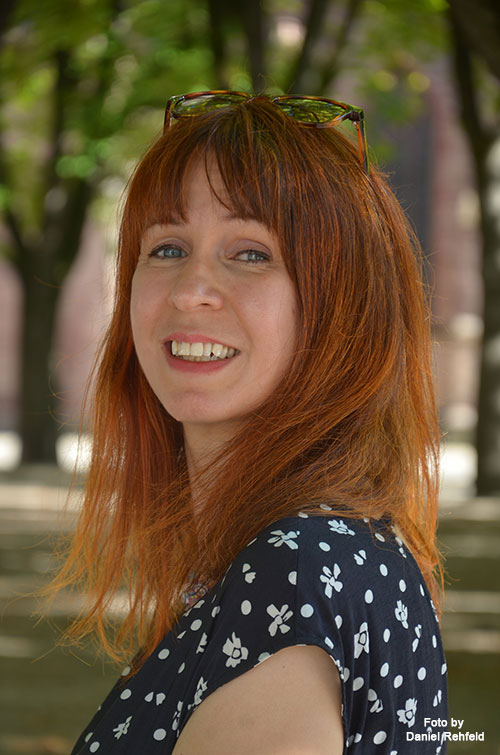



0 Comments